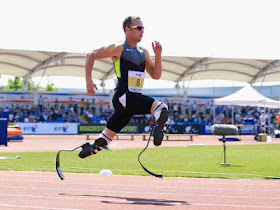 |
| Oscar Pistorius running on his Cheetah blades |
The Olympic Games begin this week in London, and the stories of aspiring athletes hoping to win a medal are all over the news. The controversial buzz surrounding one track star representing South Africa stems from the fact that he is a double amputee who will be wearing carbon fiber prosthetic blades when running the 400 meter and 4x400 meter relay.
South African sprinter Oscar Pistorius will be the first double amputee to compete in the Olympic games. Both of his legs were amputated below the knee before he was one-year-old, and he has been using prosthetic legs ever since. He just learned that he will be representing South Africa in the Olympic games earlier this month.
Pistorius is no stranger to controversy. His road to the Olympics has been full of obstacles, and he has had to fight to compete against his non-disabled peers. Initially banned from competing in the 2008 Olympics, Pistorius fought the decision and won. The decision was overturned by the Court Arbitration of Sport and he was cleared to compete. He missed qualifying for the 2008 games by a fraction of a second. This year the 25-year-old Pistorius's groundbreaking participation in the Olympic Games is eliciting speculation by his peers, sports enthusiasts and the scientific community.
Now that he has qualified for the games, whispers of “unfair advantage” are growing louder. One Olympic Gold Medalist recently made a public comment that his prosthetic legs may give him an unfair edge. Even researchers who have studied Pistorius are speculating that perhaps he may have an advantage over other Olympic athletes. The cause of the debate springs from Pistorius’s flex-foot Cheetah blades.
Prosthetic legs, a type of assistive technology, allow users the ability to compete in sports, walk and run when they would be unable to do so without them. We don’t hear about the unfair advantage of athletes who have legs competing in the Olympics or the apparent advantages of suitable body type, time or money. So why all the controversy over the prosthetic legs?
It’s the design of Pistorius’s prosthetic blades that have people talking. His Cheetah blades are light, flexible and designed to absorb shock for the user. In 2008, a study by researchers at Rice University examined Pistorius’s leg movements, oxygen consumption, endurance, leg repositioning time and the forces absorbed by the ground while running. Their conclusion found that he was, “physiologically similar but mechanically dissimilar" to non-disabled athletes. He uses oxygen like other athletes but moves his body differently. The researchers did not find a distinct advantage in the use of his prosthetic blades. It was this conclusion that ultimately reversed the decision to ban Pistorius from participation in the 2008 Olympic games. Pistorius consented to the study of his body movement to prove that his ability to run was due to his own talent.
Although researchers theorize that Pistorius might have better overall endurance and an advantage on straightaways, they believe him to be at a disadvantage at the beginning of each race and around turns. His legs are simply lighter and he has to push down harder against the ground to produce the same amount of force as most other athletes.
For all the talk of advantages and disadvantages, it will be exciting to see Pistorius’s Olympic debut on August 4th, the opening day of the 400-meter heats. I know I will be watching.
Pistorius will also participate in the Paralympic games immediately following the Olympics. He is already a Paralympics gold medalist.
What do you think about athletes with prosthetic limbs competing in the Olympic games? Is it an unfair advantage or do the prosthetics simply even the playing field? Please share your thoughts in the comment box below.

I think it's utterly ridiculous that people are complaining about this man's prosthetic legs. There was so much complaint when Casey Martin successfully sued the PGA to use a golf cart, citing "unfair advantage." Many years later those who complained the loudest then have changed their tune.
ReplyDeleteI think this too will be a non-issue. I just hope that he finishes 2nd (to the U.S.!!)
I think he should definitely be allowed to compete - what an amazing accomplishment! It would be discriminatory to not let him.
ReplyDeleteProudly South African!!!! What an inspiration he is to so many out there. America just loves to criticise!!!!! He did it!!! So get over it!!!! Go Team South Africa :-))
ReplyDeleteThere's no reason for this magnificent man to not participate in the Olympics. He powered through a life of hardship to get this far, so it'd just be cruel to turn him down. Besides, what difference can it really make?
ReplyDeleteI also think that there is no unfair advantage for this man with prosthetic legs as he surely suffered a lot of difficulties and problem for the attainment of this place in the Olympics.
ReplyDelete